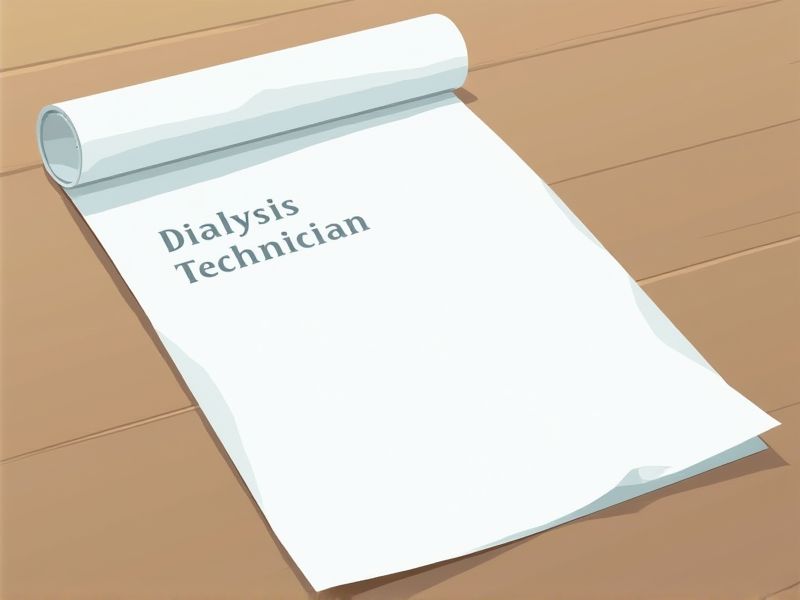
Dialysis Technicians play a critical role in managing the complex process of blood filtration, directly impacting patient health outcomes. Specific certifications ensure technicians are proficient in using dialysis equipment, maintaining sterile environments, and understanding medical protocols. These qualifications also demonstrate a commitment to meeting industry standards and ongoing professional development. Consider these key certifications you may need to succeed as a Dialysis Technician.
Certified Dialysis Technician (CDT)
The role of a Certified Dialysis Technician (CDT) enhances patient safety by ensuring adherence to strict protocols and guidelines. Certification ensures that a dialysis technician has undergone rigorous training, providing patients with quality care. A CDT can effectively troubleshoot and manage complications, thus reducing potential risks during procedures. Employers often prefer or require certification, as it reflects a high standard of competency and professionalism in the field.
Certified Hemodialysis Technician (CHT)
The demand for certified hemodialysis technicians arises due to the increasing prevalence of chronic kidney disease, which requires specialized care. Certification ensures technicians are equipped with the necessary skills and knowledge to safely operate dialysis machines and monitor patient care. Hospitals and clinics prioritize hiring certified individuals to maintain a standard of care and reduce the risk of complications during treatment. Certified technicians often improve treatment outcomes and enhance patient trust in healthcare settings.
Certified Peritoneal Dialysis Technician (CPDT)
The presence of a Certified Peritoneal Dialysis Technician ensures higher standards for patient safety as they have specialized knowledge. Certification often leads to improved patient outcomes, as these technicians are trained to handle complex situations. The demand for CPDTs rises when healthcare facilities aim to provide comprehensive dialysis care. Hospitals and clinics experience smoother operations with certified staff managing peritoneal dialysis procedures effectively.
Nephrology Technician Certification (NTC)
Nephrology Technician Certification (NTC) is required because it validates a dialysis technician's knowledge and skills in managing renal patients efficiently. Certification ensures adherence to updated clinical standards, resulting in improved patient outcomes. Employers prefer certified technicians as they indicate professional competence and commitment to ongoing education. Regulatory bodies often mandate certification to meet legal and safety requirements in healthcare facilities.
Patient Care Technician (PCT) Certification
Obtaining a Patient Care Technician (PCT) Certification equips a dialysis technician with essential knowledge and skills, ensuring competent patient care during dialysis treatments. Certified technicians adhere to stringent industry standards, promoting higher safety and efficacy in patient outcomes. PCT certification often serves as a requirement for employment in many healthcare facilities, increasing job opportunities and career stability. Certification demonstrates a commitment to professional development, enhancing trust from patients and healthcare teams alike.
Basic Life Support (BLS) Certification
Possessing a BLS Certification allows dialysis technicians to respond effectively during cardiac or respiratory emergencies that might occur during treatment. Having this certification enhances patient safety by ensuring technicians are prepared to perform CPR and use automated external defibrillators when necessary. Many healthcare facilities mandate BLS certification for compliance with industry safety standards. The certification process enhances a technician's skill set, making them a more valuable asset to the healthcare team.
Cardiopulmonary Resuscitation (CPR) Certification
Dialysis technicians work closely with patients who often have complex medical conditions, increasing the risk of cardiac emergencies during treatment. CPR certification ensures that these technicians are prepared to respond effectively to sudden cardiac arrest situations, thereby improving patient survival rates. Training in CPR provides essential skills like chest compressions and rescue breathing, which are critical in maintaining blood flow to vital organs until further medical help is available. With CPR certification, dialysis technicians enhance overall patient care quality and contribute to a safer healthcare environment.
Infection Control Certification
Infection control certification provides dialysis technicians with the knowledge to prevent and manage infections efficiently, critical in their daily interactions with patients. By understanding the principles of infection control, technicians can minimize the risk of transmitting infections, enhancing patient safety. Certified technicians are better equipped to comply with healthcare regulations and standards, which can lead to improved patient outcomes. Facilities employing certified professionals may experience reduced healthcare-associated infections, potentially decreasing operational costs and improving reputation.
Medical Terminology Certification
Proficiency in medical terminology enables dialysis technicians to communicate effectively with healthcare professionals, reducing the risk of errors. Understanding medical terms helps technicians accurately document patient information and treatment procedures in medical records. Certification in medical terminology equips technicians with the necessary language skills to interpret doctors' orders and respond appropriately. Proper comprehension of medical vocabulary is essential for ensuring patient safety and improving overall quality of care in dialysis settings.
Health Care Safety Certification
Health Care Safety Certification for dialysis technicians helps ensure they adhere to critical protocols that protect patients from infections and complications related to dialysis treatment. This certification validates the technician's knowledge and competence in handling complex dialysis equipment safely, reducing the risk of technical malfunctions that can harm patients. Proper certification ensures compliance with federal and state health regulations, which mitigates legal and financial liabilities for healthcare facilities. The emphasis on safety standards enhances patient trust and can lead to improved outcomes through consistent, high-quality care.
Summary
When you, as a dialysis technician, obtain certifications, you can expect increased job opportunities and potentially higher salaries. Certifications can enhance your skills, thereby improving patient care and treatment outcomes. These credentials might boost your professional credibility, making you a more attractive candidate to employers. In the long run, specialization through certifications can lead to career advancement and personal satisfaction in the healthcare field.
